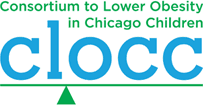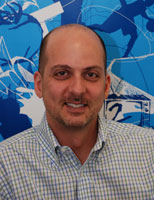by Adam Becker, PhD, MPH, Executive Director
Welcome to the third quarter of our 10th anniversary year! This quarter, we are focusing on one of the things that makes our consortium truly unique – the innovative partnerships that help us to span professional and geographical boundaries and take a holistic approach to confronting the childhood obesity epidemic in Chicago and beyond.
In addition to the community-based organizations we highlighted last quarter, CLOCC also includes other segments of our community that are very engaged in our work and bring their own unique perspective. These include our clinical, school, corporate, and advocacy partners. From CLOCC’s beginning back in 2002, we recognized the importance of these segments and the importance of engaging them as we built our consortium. In fact, the Clinical Practices, Government Policies and Programs, and School Systems Working Groups are among the original working groups from those early days!
The clinical perspective has always been a significant part of CLOCC’s focus and make-up. Our founder, Dr. Katherine Kaufer Christoffel, was a pediatrician on staff at the Ann and Robert H. Lurie Children’s Hospital of Chicago (formerly Children’s Memorial Hospital). Her vision for the consortium grew out of her daily experience in her clinical practice – seeing increasing numbers of obese patients in the Nutrition Clinic she also founded. Being based at Lurie Children’s meant that we were immersed and well-versed in the clinical significance of this epidemic.
Also from the beginning, we recognized that we could not address childhood obesity without significant engagement with local neighborhood schools and Chicago Public Schools as a district. Children spend a significant percentage of their day in schools, eat at least one and sometimes as many as three meals a day on school grounds, and thus schools are ideal places to educate children about healthy eating and physical activity and create daily opportunities for them to practice healthy behaviors. Our partnership with Chicago Public Schools extends all the way back to 2003, when we worked with school nurses to gather student body mass index (BMI) data using the Illinois Child Health Examination Forms submitted by every child at school entry. This project led to a significant event in CLOCC’s history – the release of the first-ever prevalence data for Chicago children ages 3 – 7 in December of 2003. This release, which was front-page news in the city, alerted Chicagoans that the obesity rate among these young children in Chicago was 2 ½ times the national average, and it put CLOCC “on the map.” This marked the beginning of a very productive relationship with CPS, and they remain engaged in CLOCC in very important ways. In fact, one of the major pillars of our Healthy Places project involves a partnership with CPS and Healthy Schools Campaign to promote school wellness and help CPS schools achieve “gold status” in the HealthierUS School Challenge. Over the years, we have also worked with charter schools, Head Start centers, and other settings where children learn and play, and these environments continue to be a significant focus in our work.
The corporate sector is a group whose active engagement in CLOCC generates a lot of interest. CLOCC established the Corporate Advisory Committee (CAC) in 2004. The CAC provides an opportunity for CLOCC and for-profit leaders to understand and learn from each other regarding the challenges and opportunities for obesity prevention from a unique perspective. The CAC also gives corporations a place at the table to explore and implement obesity prevention strategies using their unique skills and resources. We understood early on that the corporate sector has a role to play, and we have relied on their vision, expertise, and enthusiasm to tackle this problem over the years. The CAC supported the work that went into creating our public education message, 5-4-3-2-1 Go!®, and they continue to support our efforts to spread the message throughout the city and state by helping to fund training, outreach, and educational materials. These relationships are not without challenges as public health and for-profit priorities are not always exactly “in sync,” but we remain committed to active engagement and cross-learning and firmly believe that all organizations have a role to play if we are truly going to turn the tide on childhood obesity in Chicago and across the nation. I want to take this opportunity to especially thank our 10th Anniversary Sponsor, BlueCross and BlueShield of Illinois, whose generous support is making special 10 year anniversary activities possible. You can read more about these activities here.
Our policy and advocacy work brings together the efforts of multiple sectors to make sure that children (and the adults that care for them) have opportunities to eat healthy and be physically active where they live, work, learn, and play. Policy and advocacy work is one of the original cornerstones of CLOCC’s work. In 2005, our efforts resulted in the adoption of Public Act 093-0966, which created the Illinois Childhood Obesity Study and Prevention Fund. Also at that time, we convened over 80 stakeholder organizations to create the Illinois Childhood Obesity Prevention Consensus Agenda, resulting in five legislative bills whose passage we supported, with four of them being adopted as Public Acts. These acts put tighter parameters on physical education waivers that schools could seek, added a nutrition and physical activity agenda to the mandate of the Illinois Early Learning Council, created an Illinois Food Policy Council, and created the state mechanism for disseminating federal safe routes to school funds. In 2006, CLOCC established the City of Chicago Inter-Departmental Task Force on Childhood Obesity (IDTF), led by the Chicago Department of Public Health. Originally comprised of four city agencies, the IDTF has grown to include 11 city agencies, all working together to address the childhood obesity epidemic as a city by deploying resources in a coordinated way.
These details just scratch the surface of all the ways that our consortium has engaged diverse partners from multiple sectors in Chicago and beyond. And strong diverse partners is exactly what our consortium will continue to depend on as we look toward the work of the fourth and final quarter of this remarkable celebration of our 10 years together! Look for a new post from me in October when I will talk about CLOCC’s vision for the future. With a decade under our belts as a consortium focused on the childhood obesity epidemic, what do we think the next ten years should look like? Our fourth quarter activities will focus on what promises to be an exciting and challenging future. Talk to you again soon!




